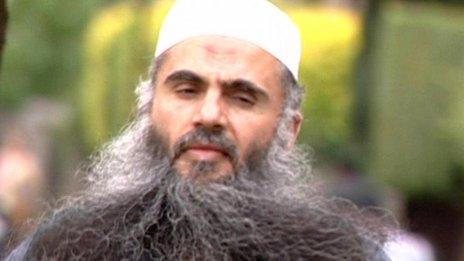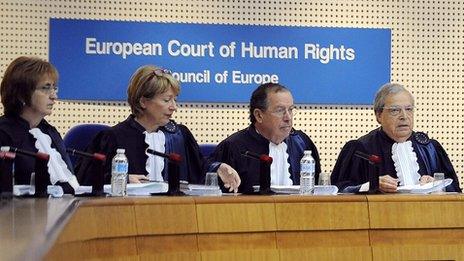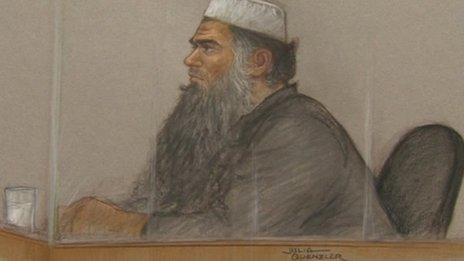Abu Qatada deportation in confusion after appeal lodged
- Published
May: "It is up to the European Courts to decide whether to accept the appeal outside the deadline"
Radical cleric Abu Qatada's deportation has been thrown into doubt after the European Court of Human Rights said it had received a last-minute appeal.
Home Secretary Theresa May said the appeal was a "delaying tactic".
The appeal was lodged late last night, but Mrs May said she was "absolutely clear" that the deadline had expired.
An appeal means the deportation process cannot begin until a panel of judges has decided whether the case should go to the Grand Chamber of the court.
Prime Minister David Cameron said that Abu Qatada has no right to stay in the UK
"He is a threat to our security, he has absolutely no further call on our hospitality and he should be deported.
"That is what we are determined to achieve, no matter how difficult it is, no matter how long it may take," he said.
Mr Qatada, 51, who faces charges in Jordan of plotting bomb attacks, had been arrested on Tuesday and denied bail.
In a statement to the Commons later, Mrs May, believing the deadline for an appeal had passed, said he could be removed from the UK "in full compliance of law".
However, on Wednesday the court said it received a request at 22:00 BST on Tuesday, which it said was before the deadline.
A panel of five judges will now decide if the case should go to the Grand Chamber. A court spokeswoman said the panel always considers the timing of the referral request and decides whether it was before or after the deadline.
Mrs May told the BBC that the deadline was three months from 17 January, making it 16 April.
"We are absolutely clear that the deadline for his appeal had expired," she said in an interview with the BBC.
A European court official later said: "We cannot comment on the view taken by the UK authorities about when the deadline expired."
If the judges decide the case will not go before the Grand Chamber, the deportation process can resume.
"It is the case that I want to see Abu Qatada deported; this is a delaying tactic from him," Mrs May said.
"I am absolutely clear that once we are through this we will resume these deportation proceedings, because I know I want to see Abu Qatada on a plane to Jordan. And I know that that is what the British public want."
Blocked deportation
The European Court of Human Rights had blocked Abu Qatada's deportation to Jordan in January, saying evidence obtained by torture might be used against him.
Weeks later, his six-year detention in the UK ended on the orders of a judge, under strict bail conditions, including a 22-hour curfew allowing him to leave home for a maximum of an hour, twice a day.
Mrs May travelled to Jordan in March for talks with the king and ministers on the case of the Palestinian-Jordanian, whom ministers have described as "extremely dangerous" and consider a threat to UK national security.
Before the appeal was lodged, lawyers for Mrs May had told a Special Immigration Appeals Commission hearing this week that she intended to deport the cleric on or around 30 April.
BBC political correspondent Norman Smith said that if the deadline was indeed Tuesday it would raise the issue of whether Abu Qatada had been arrested and detained before UK officials were legally entitled to do so.
However, Mrs May said there was "no question" that the UK had broken any law in arresting Abu Qatada.
The handling of the case was criticised by shadow home secretary Yvette Cooper, who said: "This is becoming a shambles and a confusion. We don't want the Home Office taking any risks with this case.
"It's really important that Abu Qatada is deported, and also held in custody before that, but at the moment that seems to have been put at risk by confusion and chaos over exactly what date things should happen. That's not the kind of action we need."
Keith Vaz: 'This has become chaotic and almost farcical'
Keith Vaz, chairman of the home affairs select committee, said the situation had turned "chaotic and almost farcical".
"It's very important that [Mrs May] should clarify this as soon as possible by making a statement to the House after she knows what the facts are," he said.
Senior Conservative backbencher David Davis described the ECHR judges as "making the law up as they go along".
"The raw truth is that [Abu Qatada's] got to face justice at some point," he said.
"We've got to get the ECHR to understand this. I don't think there's a risk of him being tortured. I don't think there's a risk of him facing an injustice.
"I think the Jordanians have said in terms that they won't use evidence from torture in his case, so I can't see where there is a problem with extradition."
- Published26 June 2014

- Published23 April 2012

- Published17 April 2012
